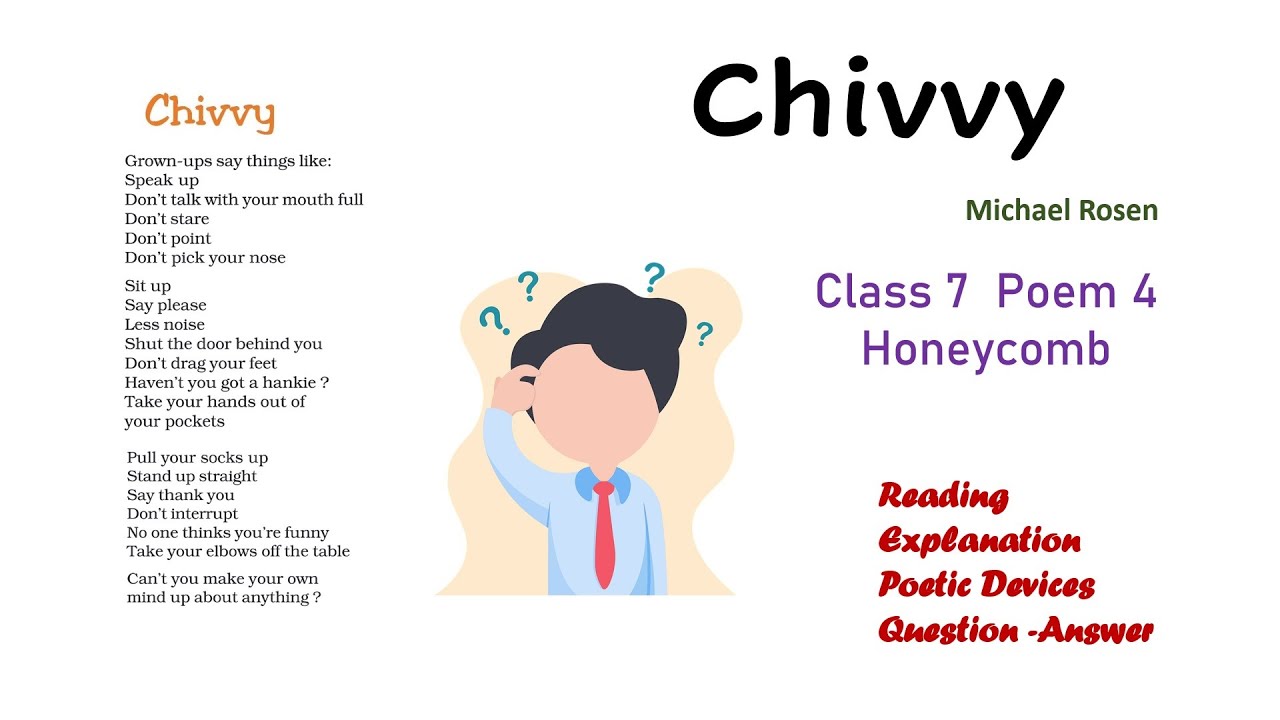
About Lesson
“Chivvy” by Michael Rosen
Introduction:
- The poem “Chivvy” by Michael Rosen humorously captures the experience of children being constantly nagged by adults. The term “chivvy” means to continually urge someone to do something, often in an annoying way. The poem lists a series of commands that adults commonly give to children.
Key Points:
-
Constant Instructions from Adults:
- The poem highlights how adults frequently instruct children on their behavior.
- These commands cover various aspects of manners and etiquette.
-
Examples of Instructions:
- Speech and Manners:
- “Speak up” and “Don’t talk with your mouth full” show adults emphasizing proper speaking manners.
- Behavior:
- “Don’t stare,” “Don’t point,” and “Don’t pick your nose” are about polite behavior in public.
- Posture and Cleanliness:
- “Sit up,” “Pull your socks up,” “Stand up straight,” and “Take your hands out of your pockets” focus on posture.
- Politeness:
- “Say please,” “Say thank you,” “No one thinks you’re funny,” and “Don’t interrupt” encourage politeness and social awareness.
- Noise and Tidiness:
- “Less noise,” “Shut the door behind you,” “Don’t drag your feet,” “Haven’t you got a hankie?” and “Take your elbows off the table” are about being quiet, clean, and tidy.
- Independence:
- “Can’t you make your own mind up about anything?” highlights the expectation for children to be decisive.
- Speech and Manners:
-
Tone and Mood:
- The tone of the poem is both humorous and slightly exasperated, reflecting the poet’s amusement and mild irritation with the endless instructions.
- It captures the child’s perspective, feeling overwhelmed by the constant barrage of dos and don’ts from adults.
-
Underlying Message:
- While the poem lists various instructions, it subtly questions the necessity and impact of constant nagging on children.
- It encourages readers to reflect on whether such persistent urging is helpful or just annoying.
-
Relatability:
- The poem is relatable to both children and adults. Children see their daily experiences reflected, and adults recognize their own behavior.
- It serves as a reminder for adults to be mindful of how they communicate with children.
Discussion Questions:
-
Do you like to be always told what to do or not to do?
- This question encourages students to reflect on their feelings about constant instructions.
-
Do grown-ups do this, in your experience?
- Students can share their personal experiences of being chivvied by adults.
Join the conversation
